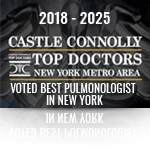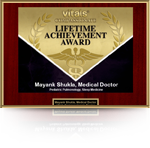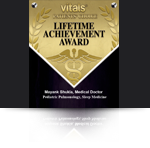Ready to Schedule an
Appointment with Dr. Shukla?
Detecting a Sleep Disorder
How to Detect a Sleep Disorder
Being able to get a full night’s sleep is difficult for some adults. Without enough sleep the body cannot perform to its full potential. It may be difficult for a sleep doctor to detect the problem while the patient is awake. Daytime sleepiness or difficulty staying alert are two indications of a sleep disorder or poor sleep hygiene. If you are concerned that you or a loved one has a problem with sleep, inform your doctor. You may need a polysomnography or sleep study, which measures the magnitude of the sleeping problems and can help detect if you have a sleep disorder.
According to the Centers for Disease Control and Prevention, an estimated 50 to 70 million adults have a sleep or wakefulness disorder. People often wonder why they cannot fall asleep at a reasonable hour. While they are not alone, there are solutions for their sleep disorders. When sleep disruption persists, seek a doctor’s advice or visit a sleep clinic for a proper diagnosis.
Polysomnography is a sleep test that is used to detect and diagnose sleep disorders. During the test, elements of sleep are recorded, such as non-rapid eye movement and rapid eye movement. It also records breathing patterns, heart rhythms and limb movements. Dr. Mayank Shukla may recommend this test for patients who show symptoms of a sleeping disorder.
Types of Sleep Disorders seen at
Dr. Shukla’s New York Sleep Clinic
How can I detect if I have a sleeping disorder?
- Sleep apnea
- Limb movement disorder
- REM sleep behavior disorder
- Narcolepsy
- Chronic insomnia
- Unusual sleep behavior
Everyone experiences sleeping issues once in a while, but sleeping difficulties may also be a symptom of a more serious medical condition. You may have a sleeping disorder if you have the following symptoms:
- Loud snoring
- Choking or gasping for air during sleep
- Unusual movement while asleep
- Struggling to stay awake
- Morning headaches
- Feeling irritable throughout the day
- Struggling to concentrate when awake
- Mood swings, feeling depressed
- Dry throat in the morning
- Grinding teeth while asleep
- Falling asleep while driving
- Require caffeine to stay awake
Of course, all of these problems can be connected to other problems, so it is important to discuss any trouble with sleeping that you might be having with a skilled physician who is knowledgeable about sleep disorders. A good night’s rest starts with a correct diagnosis.
When should I visit a sleep doctor?
Visit your doctor when you experience:
- Difficulty sleeping
- Tiredness throughout the day, even after seven hours of sleep
- Reduced or impaired ability to perform daily activities
Record your symptoms every day in a sleep diary. Describe in detail what you did before you went to bed, what time you went to bed, and how long it took you to fall asleep. Indicate how easy or difficult it was for you to fall asleep, and list the number of times your sleep was disturbed.
What are the benefits of a polysomnography?
A sleep study or polysomnography provides the sleep doctor with significant data including:
- Sleep and wake times
- Sleep stages
- Abnormal breathing
- Amount of oxygen in blood
- Movement during sleep
Sleep studies are necessary to diagnose which type of sleep disorder is affecting the patient. With a close look at sleep patterns and behaviors, the doctor will determine the treatment needed to relieve symptoms.
Of course, the causes of your specific sleep apnea can vary, and only your doctor can help you determine the precise underlying cause.
What can I do to achieve better quality sleep?
There is no substitute for good sleep hygiene. Making the body relaxed and ready for sleep is a challenge. Most adults need between six and nine hours of sleep every night, and sticking to a strict sleeping schedule can help the body be accustomed to sleeping the same hours every night. For people having trouble sleeping, here is what can be done to make the body more relaxed and ready for sleep:
- Take a warm bath
- Write ‘to do lists’ to help plan your week
- Relaxation exercises
- Listen to soft, soothing music
- Read a book or an article about sleep from our Sleep Center.
It is important to create a relaxed sleeping environment. There are many things that keep the body from relaxing at night, such as watching TV, use of electronics, bright lights, noise and a poor mattress. Ridding the body of unhealthy habits will promote quality sleep.
Dr. Shukla is an Expert at Detecting a Sleep Disorder
If you are having persistently irregular or disrupted sleep, then visit Dr. Shukla’s New York Sleep Centers to find out if you have a sleeping disorder. Don’t let those nights of counting sheep keep you from a good night’s rest. Let Dr. Shukla help you get a good night’s rest.Awards and Recognition
Dr. Mayank Shukla Top-Rated Pulmonologist 2018 - 2025
















